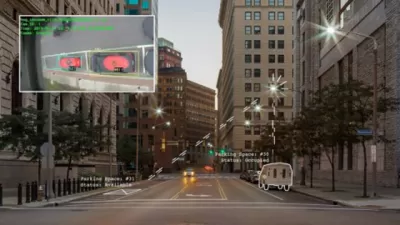The continued improvement of digital technology should benefit evidence-based policy and decision-making. Welcome to a new era of planning simulations.

Laura Adler surveys the world of data-driven simulations in the field of planning. Simulations have been a part of planning practice for decades, as Adler notes, but recent improvements in data collection and computing power empower planners in new and constantly evolving ways.
Adler surveys the latest in technology, grouping the state of the art in simulation into two groups:
Comprehensive Models
- UrbanSim, founded by University of California, Berkeley Professor Paul Waddell, "allows users to run simulations, draw from a library of open data, and produce visualizations."
- MIT's Changing Places initiative has developed CityScope, "an urban simulation tool that integrates physical representation—using Legos—with projections and visualization tools."
- Participatory Chinatown, from Emerson College, "used a multiplayer game format to engage citizens in a number of simulated neighborhood activities inside a digital recreation of Boston’s Chinatown."
Specific Systems
- The "urban intelligence network," or AURIN, from Australia, "is a state-run resource for the nation’s cities and towns that provides datasets and online tools for analysis, modeling, and visualization."
- "In Chicago, the Metropolitan Planning Council developed the TOD Calculator (for Transit Oriented Development) to help residents learn about the economic and sustainability benefits of potential TOD sites."
- Arizona State University researchers developed the Phoenix WaterSim "to help the Phoenix metropolitan government estimate supply and demand in order to effectively manage its limited resources."
The survey includes more examples of each variety. Also included in the article are simple descriptions of the benefits of simulation, including the ability to anticipate and mitigate unintended consequences and to bridge gaps of representation in the planning process.
FULL STORY: SimCities: Can City Planning Mistakes Be Avoided Through Data-Driven Simulations?

Alabama: Trump Terminates Settlements for Black Communities Harmed By Raw Sewage
Trump deemed the landmark civil rights agreement “illegal DEI and environmental justice policy.”

Study: Maui’s Plan to Convert Vacation Rentals to Long-Term Housing Could Cause Nearly $1 Billion Economic Loss
The plan would reduce visitor accommodation by 25% resulting in 1,900 jobs lost.

Planetizen Federal Action Tracker
A weekly monitor of how Trump’s orders and actions are impacting planners and planning in America.

Waymo Gets Permission to Map SF’s Market Street
If allowed to operate on the traffic-restricted street, Waymo’s autonomous taxis would have a leg up over ride-hailing competitors — and counter the city’s efforts to grow bike and pedestrian on the thoroughfare.

Parklet Symposium Highlights the Success of Shared Spaces
Parklets got a boost during the Covid-19 pandemic, when the concept was translated to outdoor dining programs that offered restaurants a lifeline during the shutdown.

Federal Homelessness Agency Places Entire Staff on Leave
The U.S. Interagency Council on Homelessness is the only federal agency dedicated to preventing and ending homelessness.
Urban Design for Planners 1: Software Tools
This six-course series explores essential urban design concepts using open source software and equips planners with the tools they need to participate fully in the urban design process.
Planning for Universal Design
Learn the tools for implementing Universal Design in planning regulations.
Caltrans
Smith Gee Studio
Institute for Housing and Urban Development Studies (IHS)
City of Grandview
Harvard GSD Executive Education
Toledo-Lucas County Plan Commissions
Salt Lake City
NYU Wagner Graduate School of Public Service





























